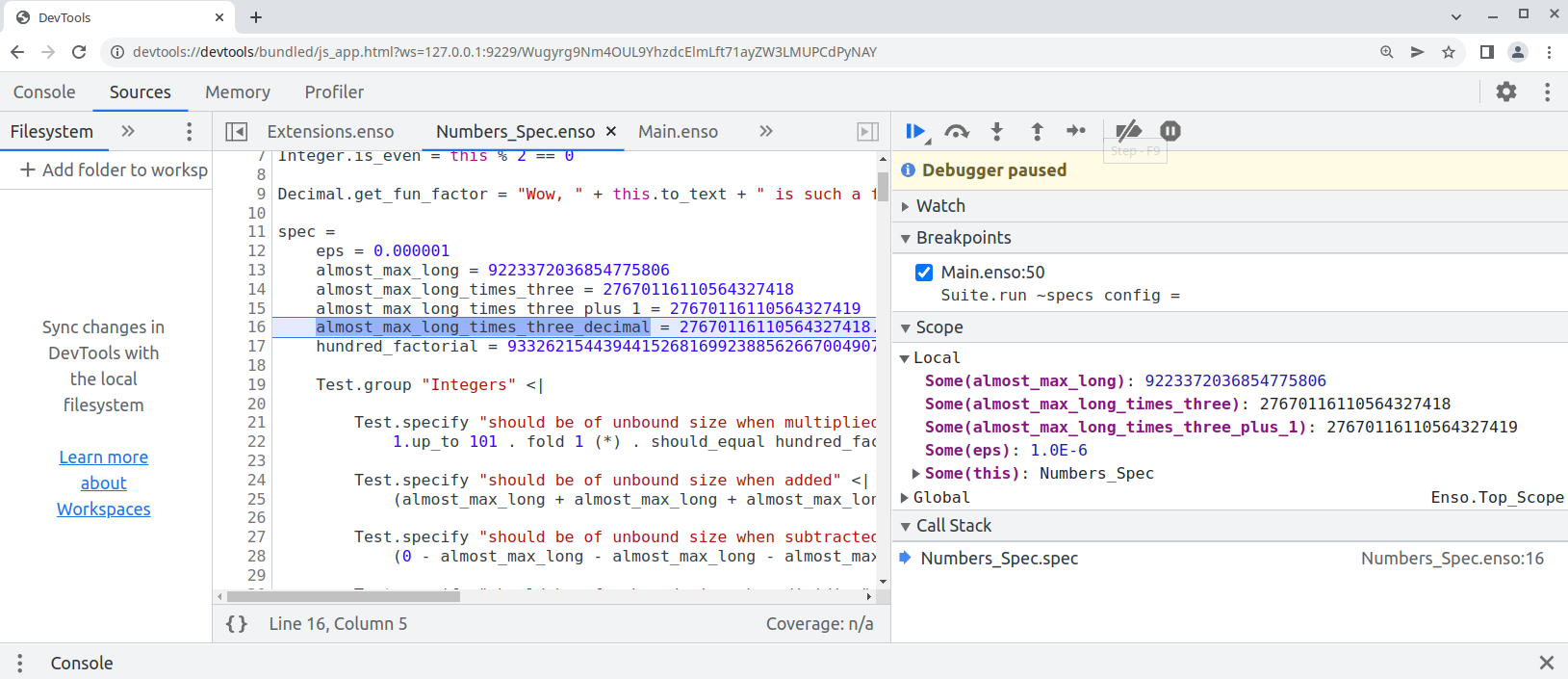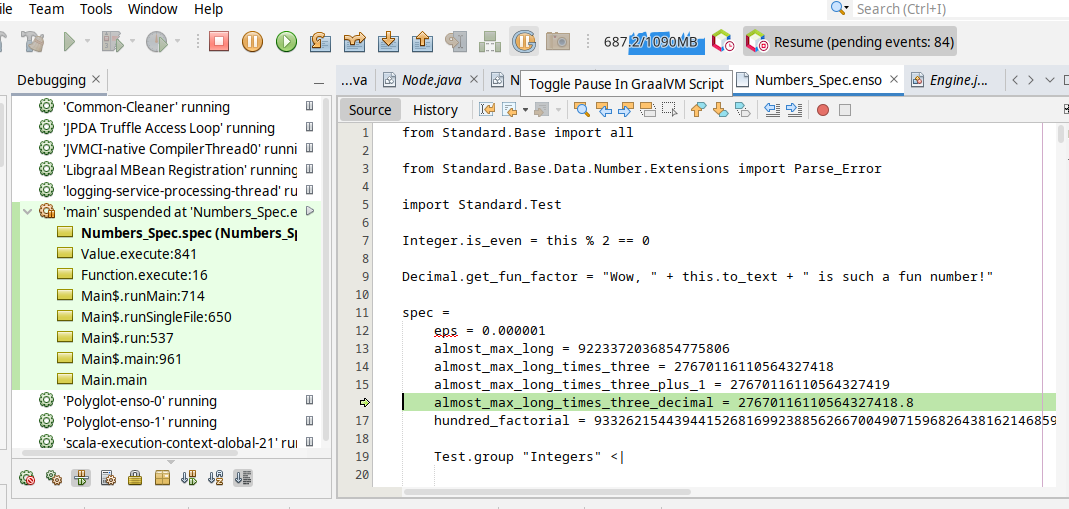Auxiliary sbt commands for building individual
stdlib packages.
The commands check if the engine distribution was built at least once,
and only copy the necessary package files if necessary.
So far added:
- `buildStdLibBase`
- `buildStdLibDatabase`
- `buildStdLibTable`
- `buildStdLibImage`
- `buildStdLibGoogle_Api`
Related to [#182014385](https://www.pivotaltracker.com/story/show/182014385)
In order to analyse why the `runner.jar` is slow to start, let's _"self sample"_ it using the [sampler library](https://bits.netbeans.org/dev/javadoc/org-netbeans-modules-sampler/org/netbeans/modules/sampler/Sampler.html). As soon as the `Main.main` is launched, the sampling starts and once the server is up, it writes its data into `/tmp/language-server.npss`.
Open the `/tmp/language-server.npss` with [VisualVM](https://visualvm.github.io) - you should have one copy in your
GraalVM `bin/jvisualvm` directory and there has to be a GraalVM to run Enso.
#### Changelog
- add: the `MethodsSampler` that gathers information in `.npss` format
- add: `--profiling` flag that enables the sampler
- add: language server processes the updates in batches
Finally this pull request proposes `--inspect` option to allow [debugging of `.enso`](e948f2535f/docs/debugger/README.md) in Chrome Developer Tools:
```bash
enso$ ./built-distribution/enso-engine-0.0.0-dev-linux-amd64/enso-0.0.0-dev/bin/enso --inspect --run ./test/Tests/src/Data/Numbers_Spec.enso
Debugger listening on ws://127.0.0.1:9229/Wugyrg9Nm4OUL9YhzdcElmLft71ayZW3LMUPCdPyNAY
For help, see: https://www.graalvm.org/tools/chrome-debugger
E.g. in Chrome open: devtools://devtools/bundled/js_app.html?ws=127.0.0.1:9229/Wugyrg9Nm4OUL9YhzdcElmLft71ayZW3LMUPCdPyNAY
```
copy the printed URL into chrome browser and you should see:

One can also debug the `.enso` files in NetBeans or [VS Code with Apache Language Server extension](https://cwiki.apache.org/confluence/display/NETBEANS/Apache+NetBeans+Extension+for+Visual+Studio+Code) just pass in special JVM arguments:
```bash
enso$ JAVA_OPTS=-agentlib:jdwp=transport=dt_socket,server=y,address=8000 ./built-distribution/enso-engine-0.0.0-dev-linux-amd64/enso-0.0.0-dev/bin/enso --run ./test/Tests/src/Data/Numbers_Spec.enso
Listening for transport dt_socket at address: 8000
```
and then _Debug/Attach Debugger_. Once connected choose the _Toggle Pause in GraalVM Script_ button in the toolbar (the "G" button):

and your execution shall stop on the next `.enso` line of code. This mode allows to debug both - the Enso code as well as Java code.
Originally started as an attempt to write test in Java:
* test written in Java
* support for JUnit in `build.sbt`
* compile Java with `-g` - so it can be debugged
* Implementation of `StatementNode` - only gets created when `materialize` request gets to `BlockNode`
This PR replaces hard-coded `@Builtin_Method` and `@Builtin_Type` nodes in Builtins with an automated solution
that a) collects metadata from such annotations b) generates `BuiltinTypes` c) registers builtin methods with corresponding
constructors.
The main differences are:
1) The owner of the builtin method does not necessarily have to be a builtin type
2) You can now mix regular methods and builtin ones in stdlib
3) No need to keep track of builtin methods and types in various places and register them by hand (a source of many typos or omissions as it found during the process of this PR)
Related to #181497846
Benchmarks also execute within the margin of error.
### Important Notes
The PR got a bit large over time as I was moving various builtin types and finding various corner cases.
Most of the changes however are rather simple c&p from Builtins.enso to the corresponding stdlib module.
Here is the list of the most crucial updates:
- `engine/runtime/src/main/java/org/enso/interpreter/runtime/builtin/Builtins.java` - the core of the changes. We no longer register individual builtin constructors and their methods by hand. Instead, the information about those is read from 2 metadata files generated by annotation processors. When the builtin method is encountered in stdlib, we do not ignore the method. Instead we lookup it up in the list of registered functions (see `getBuiltinFunction` and `IrToTruffle`)
- `engine/runtime/src/main/java/org/enso/interpreter/runtime/callable/atom/AtomConstructor.java` has now information whether it corresponds to the builtin type or not.
- `engine/runtime/src/main/scala/org/enso/compiler/codegen/RuntimeStubsGenerator.scala` - when runtime stubs generator encounters a builtin type, based on the @Builtin_Type annotation, it looks up an existing constructor for it and registers it in the provided scope, rather than creating a new one. The scope of the constructor is also changed to the one coming from stdlib, while ensuring that synthetic methods (for fields) also get assigned correctly
- `engine/runtime/src/main/scala/org/enso/compiler/codegen/IrToTruffle.scala` - when a builtin method is encountered in stdlib we don't generate a new function node for it, instead we look it up in the list of registered builtin methods. Note that Integer and Number present a bit of a challenge because they list a whole bunch of methods that don't have a corresponding method (instead delegating to small/big integer implementations).
During the translation new atom constructors get initialized but we don't want to do it for builtins which have gone through the process earlier, hence the exception
- `lib/scala/interpreter-dsl/src/main/java/org/enso/interpreter/dsl/MethodProcessor.java` - @Builtin_Method processor not only generates the actual code fpr nodes but also collects and writes the info about them (name, class, params) to a metadata file that is read during builtins initialization
- `lib/scala/interpreter-dsl/src/main/java/org/enso/interpreter/dsl/MethodProcessor.java` - @Builtin_Method processor no longer generates only (root) nodes but also collects and writes the info about them (name, class, params) to a metadata file that is read during builtins initialization
- `lib/scala/interpreter-dsl/src/main/java/org/enso/interpreter/dsl/TypeProcessor.java` - Similar to MethodProcessor but handles @Builtin_Type annotations. It doesn't, **yet**, generate any builtin objects. It also collects the names, as present in stdlib, if any, so that we can generate the names automatically (see generated `types/ConstantsGen.java`)
- `engine/runtime/src/main/java/org/enso/interpreter/node/expression/builtin` - various classes annotated with @BuiltinType to ensure that the atom constructor is always properly registered for the builitn. Note that in order to support types fields in those, annotation takes optional `params` parameter (comma separated).
- `engine/runtime/src/bench/scala/org/enso/interpreter/bench/fixtures/semantic/AtomFixtures.scala` - drop manual creation of test list which seemed to be a relict of the old design
* Initial integration with Frgaal in sbt
Half-working since it chokes on generated classes from annotation
processor.
* Replace AutoService with ServiceProvider
For reasons unknown AutoService would fail to initialize and fail to
generate required builtin method classes.
Hidden error message is not particularly revealing on the reason for
that:
```
[error] error: Bad service configuration file, or exception thrown while constructing Processor object: javax.annotation.processing.Processor: Provider com.google.auto.service.processor.AutoServiceProcessor could not be instantiated
```
The sample records is only to demonstrate that we can now use newer Java
features.
* Cleanup + fix benchmark compilation
Bench requires jmh classes which are not available because we obviously
had to limit `java.base` modules to get Frgaal to work nicely.
For now, we default to good ol' javac for Benchmarks.
Limiting Frgaal to runtime for now, if it plays nicely, we can expand it
to other projects.
* Update CHANGELOG
* Remove dummy record class
* Update licenses
* New line
* PR review
* Update legal review
Co-authored-by: Radosław Waśko <radoslaw.wasko@enso.org>
- Add parser & handler in IDE for `executionContext/visualisationEvaluationFailed` message from Engine (fixes a developer console error "Failed to decode a notification: unknown variant `executionContext/visualisationEvaluationFailed`"). The contents of the error message will now be properly deserialized and printed to Dev Console with appropriate details.
- Fix a bug in an Enso code snippet used internally by the IDE for error visualizations preprocessing. The snippet was using not currently supported double-quote escaping in double-quote delimited strings. This lack of processing is actually a bug in the Engine, and it was reported to the Engine team, but changing the strings to single-quoted makes the snippet also more readable, so it sounds like a win anyway.
- A test is also added to the Engine CI, verifying that the snippet compiles & works correctly, to protect against similar regressions in the future.
Related: #2815
Related to #1153, implements the first part of the integration, without the
parts that use the runner which will be done next.
Temporarily there are two logger implementations - this will be alleviated with
the next part - when and the direct classpath dependency on the language server
is removed.
A bunch of improvements to the suggestions
system. Suggestions are extracted to the tree data
structure. The tree allows producing better diffs
between the file versions. And better diffs reduce
the number of updates that are sent to the IDE
after a file change, and consequently fix the
issue when the runtime type got overwritten with
the compile-time type.
Project Manager to stores its metadata inside the project directory,
instead of maintaining the global index. This will allow users to move
and modify files inside the ~/enso directory.
Names of fields `author` and `maintainer` in the `package.yaml` file
have been changed to `authors` and `maintainers` respectively, and their
format has been modified.
Projects created in older versions may not be compatible.
1. Our builds include a version check which for stability does not rely
on build.sbt but instead on querying enso --version. Building the
engine takes a lot of time, so to save that time on failed builds,
we ensure that the launcher is built first (which is much faster)
and only if its version check succeeds, the engine build is
attempted. This is achieved by making the `build-engine` job in
`release.yml` depend on `build-launcher`.
2. Enso version is bumped to `0.1.0`.
1. This commit adds an extensive library for parsing commandline
arguments and formatting output.
2. It implements the expected CLI for the launcher.
3. It turns off parallel execution on the CI in hopes of making it
more stable.
4. It implements plugin support in the launcher.
The old version did not take Language.java into account and it did not
trigger compilation on transitive dependencies.
Still did not find a way to safely re-trigger compilation, but a run
with inconsistent state is now aborted and a message is displayed to the
user to manually re-run the last task which will fix the inconsistency
problems.
Incremental compilation of instruments may lead to runtime errors when
only some of the instruments are recompiled (because the unchanged
instruments are not registered by the Annotation Processor).
To fix this, we add a task that ensures all instruments are recompiled
when at least one of them changes.
* removed IDE code
* updated readme, removed ide dir
* typo
* Update README.md
Co-Authored-By: Ara Adkins <iamrecursion@users.noreply.github.com>
* flatten common/scala to scala
Co-authored-by: Ara Adkins <iamrecursion@users.noreply.github.com>
Set "-encoding UTF-8" options for javac. Without it compilation fails on platforms where javac defaults to other encoding, like most of Windows that default to whatever code page is active in the system.
File Manager — an Akka-based service providing a basic filesystem-like API over network. Currently it just wraps the local filesystem operations. In the future support for other kinds of storage might get added. Ref #32